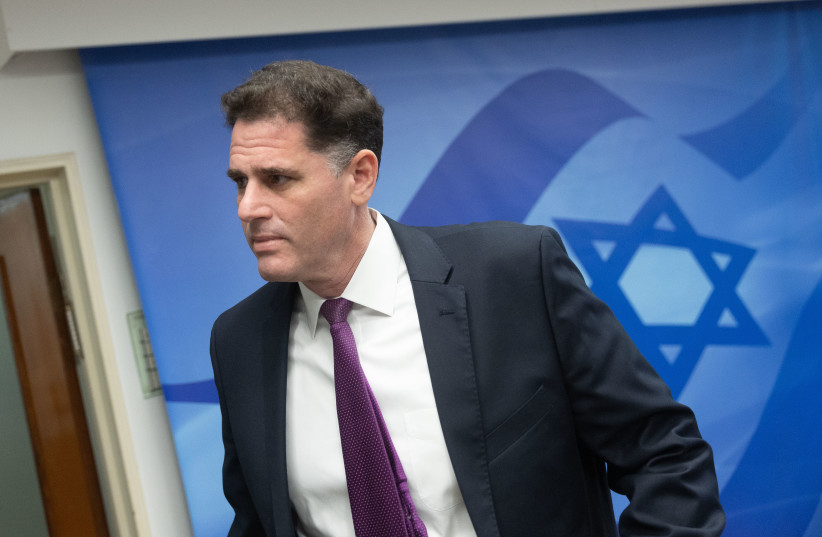Israel’s policy remains opposed to nuclear programs in the Middle East, the Prime Minister’s Office clarified on Sunday.
The statement came following an interview with Strategic Affairs Minister Ron Dermer, in which the minister did not rule out a civilian Saudi nuclear program.
The PMO highlighted that Dermer said “Israel never agreed to a nuclear program for any of its neighboring countries,” and added: “This was and remains Israel’s policy.” They did not, however, say anything about future policy.
“Prime Minister Benjamin Netanyahu brought four historic peace agreements that only strengthened Israel’s security and standing and that is what he will continue doing,” the PMO added, referring to the 2020 Abraham Accords with the UAE, Bahrain, Morocco, and Sudan.
The US has been in negotiations for Saudi Arabia to normalize relations with Israel, in addition to more favorable conditions for oil sales for the US. In return, Riyadh has asked for a civilian nuclear program, a defense pact with Washington, and Israeli concessions toward Palestinian statehood.

Dermer told PBS NewsHour on Friday that Israel would oppose a Saudi nuclear weapons program, but said that Saudi Arabia, as a signatory to the Nuclear Non-Proliferation Treaty, “could go to China or France tomorrow and they could ask them to set a civil nuclear program and to allow for domestic enrichment. The question I ask myself is, if the US is involved in this, what will that mean 10 or 20 years down the road?”
The minister questioned what safeguards are in place to ensure Riyadh would not turn to Beijing if Washington rejected their request, which many in the Israeli media interpreted as preferring US cooperation with a Saudi civilian nuclear program.
Dermer added that Saudi Arabia views peace with Israel as an anchor for its relationship with the US for the next 50 years and that such an agreement would transform the region and lead to further normalization between Israel and Arab states.
Opposition leader Yair Lapid warned against a Saudi nuclear program, even if it is civilian, writing on X, formerly twitter, that “Minister Dermer’s statement that ‘Israel will not oppose a civilian Saudi nuclear program, because there are other countries in the Middle East with nuclear programs, is factually incorrect and endangers Israeli security.”
Lapid pointed out that “the only country in the Middle East that enriches uranium as part of a nuclear program is Iran.”
“We can reach an agreement that strengthens our national security without Israel having to sign off on uranium enrichment in the Middle East,” he added.
Lapid warned earlier this month that allowing the Saudis to enrich uranium, thus having control over the whole fuel cycle, could spark an arms race in the region, with Egypt and Turkey seeking to follow suit.
What does Israel think of uranium enrichment in the Middle East?
It has long been Israel’s policy to oppose any uranium enrichment in the Middle East. The United Arab Emirates has a nuclear power plant, but it does not enrich its own uranium.
A source with knowledge of Saudi-Israel ties said that approving a civilian nuclear program would be “a dramatic shift away from Israel’s policy, and there has been little serious discussion of it, public or private.”
Even if Israel thinks Saudi Crown Prince Mohammed bin Salman has good intentions, the source added, “this is not about one person or one moment in time. If you are doing something significant, you need to look 40-50 years ahead.”
“A deal with Saudi Arabia has huge potential. Everyone in Israel would love to see it happen – but this isn’t something Israel can compromise on,” the source said.
Israel’s past three national security advisers Eyal Hulata, Meir Ben-Shabbat, and Jacob Nagel, the last two of whom worked under Prime Minister Benjamin Netanyahu, have warned in recent weeks of the dangers of a Saudi civilian nuclear program.
“Establishing relations with Saudi Arabia is an important goal for Israel,” Ben-Shabbat told media network Israel National News-Arutz Sheva earlier this month. “The list of returns that Saudi Arabia expects to get from the US is long. Some of them are not a problem for Israel.
“It would be wrong to agree, even tacitly, to concessions on the Iranian nuclear matter or the spread of nuclear [programs] in the Middle East, especially not arrangements that allow enrichment, even for civilian purposes… These prices are too high, even when it is such a great achievement,” Ben-Shabbat said.
